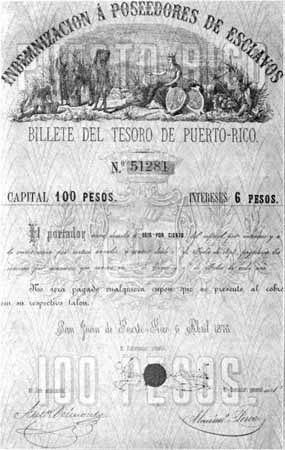
While the rest of Latin America was going through a period of great progress from the 1850s to 1880s, Puerto Rico was still under Spanish rule, which meant that the colony did not have the same liberal push to trade and modernize like other Latin American countries. For Puerto Ricans, the most significant event during this time was the abolition of slavery on the island by the Spanish National Assembly on March 22, 1873 (Acosta). This new law banning slavery freed 29,335 slaves, or 5% of the entire Puerto Rican population (Allende-Goitía 2012). Historians cite a powerful anti-slavery movement in Spain along with growing liberalism in the agricultural elite on the island as key to leading the National Assembly to abolish slavery (Acosta). Escapes and small rebellions by slaves have also been cited as forces that slowly wore down the institution of slavery over time in Puerto Rico (Acosta). Since race and class were so intertwined in Puerto Rico, the abolition of slavery led to very little change in the social hierarchy, with newly freed blacks still relegated to a class lower than that of the pre-abolition free blacks (Allende-Goitía 2012).
Because the end of slavery meant that slave owners would be taking on new labor costs, the National Assembly stipulated that freed slaves would still have to work their owner’s land for three more years and would not gain any political rights for five more years after they were freed (Acosta). Furthermore, slave owners would be compensated 35 million pestas per slave (“Abolition of Slavery”). This document is one of the indemnity bonds that was paid to a Puerto Rican slave owner after the abolition of slavery to compensate them for their loss of “property.” While far from perfect, this new law still was incredibly important in the lives of formerly enslaved people.
Works Cited
“Abolition of Slavery in Puerto Rico.” The World of 1898: The Spanish American War. The Library of Congress. Accessed March 3, 2020. https://www.loc.gov/rr/hispanic/1898/slaves.html.
Acosta, Ivonne. “Abolition of Slavery (1873).” Enciclopedia de Puerto Rico. Puerto Rican Endowment for the Humanities. Accessed March 3, 2020. https://enciclopediapr.org/en/encyclopedia/abolition-of-slavery-1873/.
Allende-Goitía, Noel. “Puerto Rico.” In Encyclopedia of Free Blacks and People of Color in the Americas, by Stewart R. King. Facts On File, 2012. http://0-search.credoreference.com.dewey2.library.denison.edu/content/entry/foffree/puerto_rico/0?institutionId=4607.
